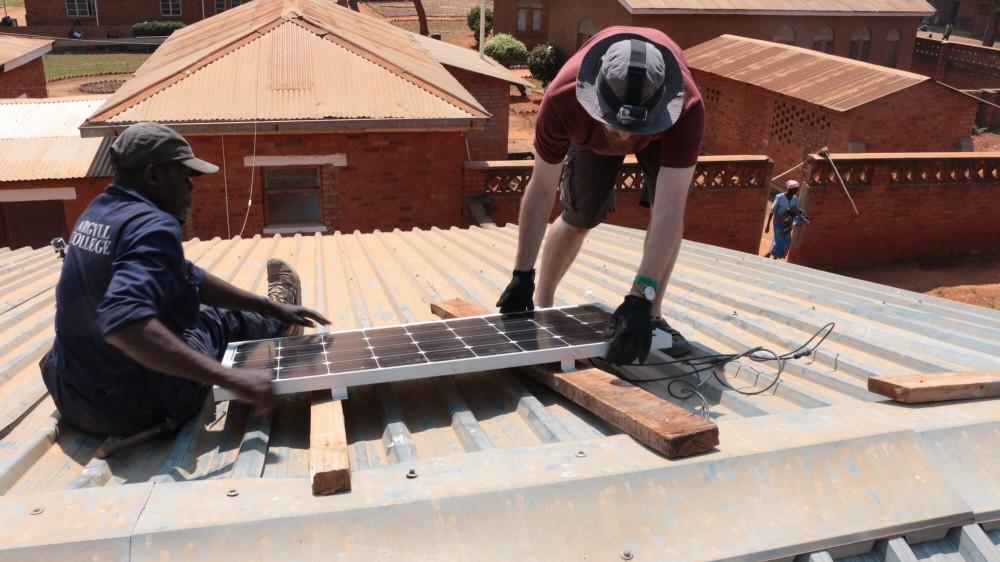Redefining community

GVL / Courtesy – Patrick McCarthy GVSU student Patrick McCarthy installs a solar panel on the room of Embangweni Mission Hospital in northwest Malawi, Africa.
Jan 26, 2017
As demonstrated in its many initiatives and projects, Grand Valley State University is committed to community service. While most people think of a community in terms of a local collection of individuals, Heidi Jiao, an engineering professor at GVSU, along with three GVSU graduate students are turning this notion on its head.
Jiao recently traveled to Malawi, Africa, with graduate students Justin Melick, Patrick McCarthy and Sofia Fanourakis to install a solar device they had created for a hospital experiencing electrical problems. The electricity would frequently go out at unexpected times, often during surgeries.
“When I heard the story from Dr. Sommers (and) how lots of patients died because the power went out, we wanted to help any way that we could,” Jiao said.
Jiao may have gone with her students for this project, but initially, the first trip to Malawi wasn’t for the engineering program. The graduate students helped fundraise money themselves so they could build the solar device and travel to Malawi for eight days.
Melick, who helped plan the logistics of the trip, said after building the heavy device—worth a couple thousand dollars—and transporting it, seeing the effects on the hospital made it all worth it.
“Engineering students learned a lot from (the trip), and to see the impact of their work first hand and getting to meet with the directors of the hospital was amazing,” Melick said.
Melick said he, along with the other two students and Jiao, learned a lot about cultural differences and the Malawi people’s limited exposure to U.S. media. He also said they supplied the time and energy needed to help fix the electricity problem there.
The Embangweni Mission Hospital covers a wide area and includes several remote clinics. The first solar device was installed in 2013 in the hospital itself, Jiao said. Two additional devices were created and are currently being used in two of the remote clinics, as well.
The solar device makes it possible for the hospital to operate solely on it for two days. However, its main function is as a backup generator for when the power outages occur at the hospital and the surrounding remote clinic sites.
Jiao said as long as the hospital and remote clinics continue to use the devices, they will continue to help keep them working. Melick explained how the devices have data trackers in them to improve the communication between the hospital and the team.
Jiao said her and her students’ mission was to start in Malawi and to keep serving underprivileged areas in other countries and in the U.S.
Melick and Jiao said the team had many difficulties, including installing the devices, going to a local town for extra parts they needed and handling financial costs. However, they both agreed at the end of the day they were proud of their work.
“It was definitely worth it,” Melick said. “The thing (for) me was helping the people there and learning from them. That’s how I got the most out of it.”

























